RAISING ENGINEERING
The Demand Grows for UTC Grads

VOLUME ONE • ISSUE ONE
CONTRIBUTING WRITER
PHOTOGRAPHER
CONTRIBUTING PHOTOGRAPHERS
VIDEOGRAPHER
University of Tennessee at Chattanooga Magazine volume one, issue one • October 2017
utc.edu/magazine
INSIDE THIS ISSUE
Message from the Chancellor
Raising Engineering
Olga De Klein
Nurse in Alaska
Teachers Extraordinaire
Fake News Explained
Mental Health Court
Yesteryear and Now
View from Vision Labs
UTC Theatre
Reese Veltenaar
Headed for Stardom
Alum News ’n Notes
Valediction
Notabilis: Bucky Wolford
George Heddleston
Vice Chancellor, Communications and Marketing
Chuck Cantrell
Associate Vice Chancellor, Communications and Marketing
Stephen Rumbaugh
Laura Bond, Chuck Cantrell, Sarah Joyner, Shawn Ryan
Chuck Wasserstrom
Angela Foster
Dominique Belanger, Adam Brimer, Esther Pederson, Taylor Slifko, FreeVectorMaps.com
Mike Andrews
We welcome your feedback: magazine@utc.edu
The University of Tennessee at Chattanooga is an equal employment opportunity/affirmative action/Title VI/Title IX/Section 504/ADA/ADEA institution. The University of Tennessee at Chattanooga is a comprehensive, community-engaged campus of the University of Tennessee System.
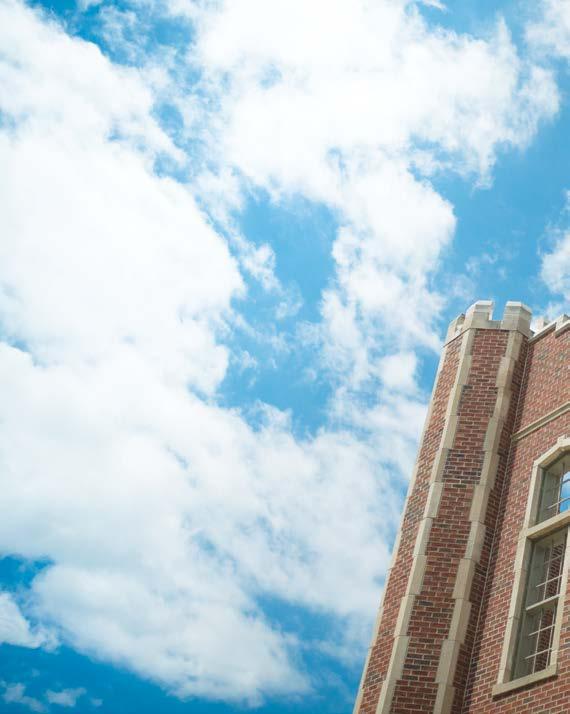
4 5 9 10 12 14 16 18 20 22 25 26 29 33 34 EDITOR ASSISTANT EDITOR CREATIVE DIRECTOR
WRITERS
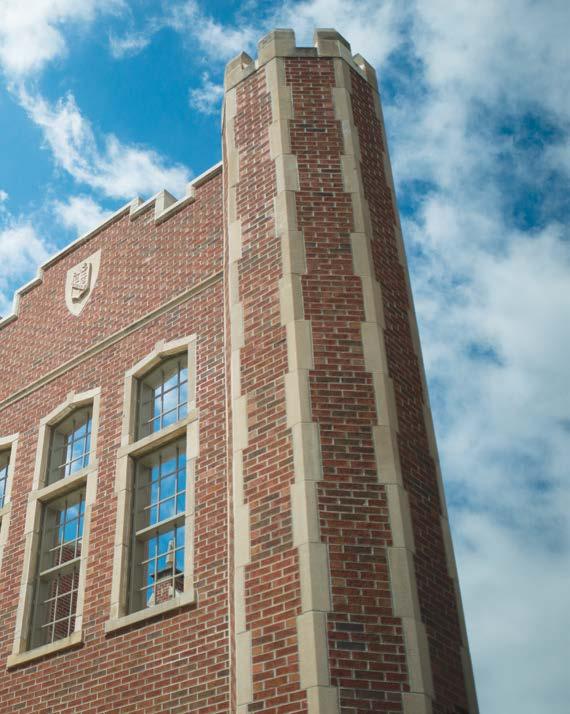 Chamberlain Pavilion
Chamberlain Pavilion
Welcome to the first issue of the new University of Tennessee at Chattanooga Magazine. Through its contents, we will keep you connected to UTC, highlighting the outstanding accomplishments—both on campus and in the community—of our alumni, current students, faculty and staff.
UTC is growing across the board— in academics, athletics, community involvement, diversity, inclusion. We refuse to stand still and say, “We have done everything we can.” Even the way we look is changing and, if you have not visited campus in a few years, you will be amazed.
Dedicated last year, Chamberlain Field has been redesigned, its spacious green expanse is now a central location for campus. You will see students throwing Frisbees or playing hacky sack, bubble soccer or simply studying, but Chamberlain also is used for speeches, awards ceremonies and campuswide events.
We have a beautiful new library, a state-of-the-art facility with a recording studio, spaces for quiet study and more than 740,000 unique titles. Our Aquatic and Recreation Center will leave you speechless with, among other features, its 156-foot-long water slide, 44-foot climbing wall and 14,000 square feet for exercise and workouts. A 600-bed West Campus Housing building is under construction to help accommodate our student enrollment growth.
The vibrancy of campus is not just in the buildings, however. It echoes in the energy of our students, faculty and alumni, people you will read about in the UTC Magazine. Everyone featured volunteers credit to UTC as a major part of their success, and that is not surprising. People have always been the heart of UTC, defining who we are and what we do. Diversity of opinions, backgrounds and beliefs are keys to our philosophy; we focus on the future while learning from our past. We are an inclusive university.
We also remain dedicated to community involvement, extending into Chattanooga and throughout the region with outreach programs. On-campus volunteers eagerly sign up for these projects and experience another way to be involved with UTC and increase the commitment for our city.
If you have never paid your alma mater a visit, or if you have not been back to campus for a number of years, I encourage you to return to UTC and experience what is happening—the people, the places, the programs. Many things have changed, but many are still as you remember.
Steven R. Angle Chancellor


 The Football Mocs, seen here playing Wofford in 1928, moved to Finley Stadium in 1997. What became of Chamberlain Field? Find out on page 18.
The Football Mocs, seen here playing Wofford in 1928, moved to Finley Stadium in 1997. What became of Chamberlain Field? Find out on page 18.
TOWERING SUCCESS

COVER STORY
CECS Rising by Shawn Ryan
Bethany Griffen Butler
Dean Pack’s Mantra:
Teamwork, Collaboration, Ambition, Work Ethic
The first time Bethany Griffin Butler climbed a TVA transmission tower—the ones that march off into the distance like giant, broad-shouldered robots with high-voltage power lines stretched between them—it was 100 feet tall.
A mere 10 stories. Straight up.
She was “a little nervous,” Butler says, but “I’ve always loved climbing and heights don’t bother me.” As proof, a photo shows her at the top of a tower, her wavy, copper hair spilling out from under a hardhat, safety harness latched onto a metal strut and a you-kiddin’me? drop below her.
As one of TVA’s transmission line engineers, climbing the tower was part of the job for Butler ’15, who earned her civil engineering degree from UTC’s College of Engineering and Computer Science last December. One month later, she started her full time job at TVA.

“Climbing the tower,” not coincidentally, is an accurate description of her time at TVA, which began in May 2013 with an internship that lasted until she graduated. As an intern—which she insists was essential in landing the full time job—she worked in such departments as Line Maintenance and Substation Physical Engineering. With each move, she faced new people, new ideas, new cultures.
“It’s always different when you transfer into another group,” she explains.
But her ability to work, cooperate and problem-solve with others— even those who speak a different technical language—is an invaluable skill she learned at UTC, she says. “It helped me tie-in the connections between what I was learning in the classroom to what I was learning here at TVA.”
Partnering with UTC
Teamwork. Collaboration. Ambition. Work ethic. Words that crop up often when local companies describe UTC engineering and computer science graduates. In turn, graduates use the same words when they describe what they learned at UTC. Yes, classroom lessons in engineering and math and chemistry and computers and other subjects, so-called “hard skills,” are crucial to earning a degree. But there also are “soft skills” such as building relationships and instilling trust that are vital elements in relationships between companies and the College of Engineering and Computer Science.
“We need top talent and we need that pipeline,” says Crystal Renner, advanced specialist in staffing at Denso Manufacturing, whose Athens, Tenn., plant fabricates automotive parts. “We also need a university that wants to continue to explore and innovate technology because our world changes quickly. We need universities that have that vision and we believe UTC is one of those schools. UTC graduates come out with the knowledge, the skills and the desire to be in the workforce, especially in technology and manufacturing … We could not be happier to partner with UTC.”
Others Agree
Echoes of Renner’s comments are heard from executives at other regional companies. After graduation, UTC students hit the ground running, they say, no babysitting needed to make sure they’re doing their job. “They want to work,” says Tim McGhee, president and CEO of the Associated General Contractors of East Tennessee. “They’re more focused on a career and not so much on staying in college for 10 more years.”
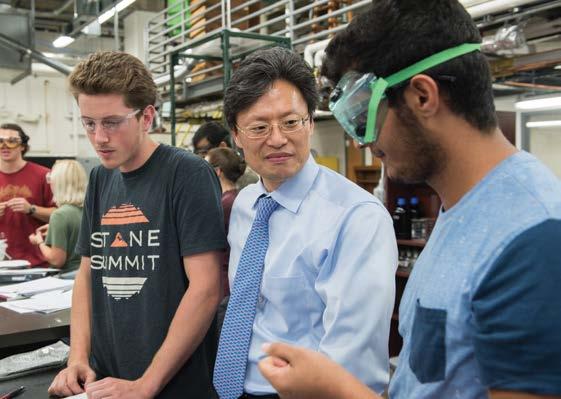
UTC programs in civil engineering and construction management take many cues from the construction industry, so “they’re closely linked to our industry’s needs,” he says. And one of those needs is a solid work ethic, something UTC graduates personify. You can have all the classroom knowledge in the world, but it’s useless if you’re unreliable or lazy. “If you can’t get to work on time or you just don’t come to work at all … well, people in our industry don’t have a lot of leniency toward delinquency and not showing up to work on time,” McGhee says.
Being ready for the world of work is one of the driving forces both in and out of the classroom at the college, says Dean Daniel Pack. “Our approach, our philosophy, is that students should not just have book knowledge but real-world knowledge and experiences,” he says. “In our classroom and coursework, we deal
The Magazine of The University of Tennessee at Chattanooga | 7
“You can do what you have to when you have to do it, whether you like it or not. You get the job done. Sometimes you have to eat a frog, but it means you get to do the things you love to do instead.”
Left to right: Mitchell Muhlada, Dr. Daniel Pack, Fahim Alzabadani
with real-world problems and having those skills and experience is paramount.”
Wally Edmondson ’01 says that, when he graduated from UTC with a degree in computer engineering (now called computer science), perhaps the most important thing he took with him was a solid work ethic, the ability to “cross the finish line.” Edmondson, who works as head of engineering for Feetz, which builds custom-made, recyclable shoes through 3D printing, says “You can do what you have to when you have to do it, whether you like it or not. You get the job done. Sometimes you have to eat a frog, but it means you get to do the things you love to do instead.”
Job Growth Explosion
Chattanooga is rated as the secondbest city in the country when it comes to the number of new engineering jobs, according to Change the Equation, a group of corporations, including Amazon, IBM, Verizon and Microsoft, pushing STEM-related initiatives. Detroit is No. 1 on the list.
Over the past five years, jobs for engineers in Chattanooga have grown by about 28 percent, Change the Equation reports. Some of that growth can be attributed to the arrival of Volkswagen in 2008 and the supply companies that have sprung up nearby, the group adds, while companies in power generation such as TVA also have brought in new jobs. Newlyminted engineering graduates earn the highest starting engineering salaries in Tennessee when they are employed in Chattanooga, studies show.
With the need for engineering employees rocketing, many companies are eager to snag UTC students. Joe Ferguson, chairman of EPB’s board of directors, says the company often finds interns, as well as full time employees, by working directly with faculty at UTC, setting up events to help students grow more comfortable with writing resumes, the interview process and networking with local businesses. UTC students “come prepared, are work-ready and have the skills needed for the positions we are looking to fill,” Ferguson says.
Equally important is the close,
trusting relationship that has developed between EPB and UTC as a whole, he says. “It’s a good relationship and that makes a whale of difference.”
Pack calls the college’s partnerships with local companies “critical,” not just through internships but through company-led information sessions, workshops and joint research projects.
Women in Engineering
Ashley Thompson Poe ’13 worked as an intern at chemical manufacturer BASF while earning her degree in chemical engineering. Upon graduation, she was immediately hired by the company. Her responsibilities at the plant on Amnicola Highway now include process and product optimization, production and maintenance support, technical support for research and development projects and handling customer concerns.
While the engineering principles she learned at UTC “directly affect my job,” she says, “the most important aspects from college that affect my job are my time management skills and my networking skills. I learned how to improve both of these skill sets as an engineering student due to the complex and difficult class schedule and by getting involved in multiple student chapters for the engineering societies such as Society of Women Engineers.”
Bethany Griffin Butler says much the same thing, describing how she juggled multiple responsibilities while in school. She attended classes, studied and completed assignments while also maintaining a life outside of school with family and church, says Butler, whose husband, Jordan, is a mechanical engineer graduate from UTC now working at Komatsu.
A major driving force through her NASCAR lifestyle was working with outside organizations. Faculty at UTC strongly urged her to join the student chapter of the American Society of Civil Engineers, saying the networking would help her career. They were right, she says. “As a member, if I wasn’t in class or at my [TVA] internship, I was doing ASCE or I was at home sleeping a couple of hours. I was going about 200 mph.”
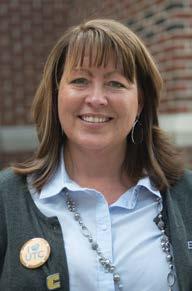
8 | The Magazine of The University of Tennessee at Chattanooga
Crystal Renner
When Olga De Klein’s son passed away after a car accident, she chose to grieve through something she loved: art. The lifelong artist turned to the canvas, painting portraits of her son until the early hours of the morning.
“I painted his face over and over again—as a baby, child and adult. It was like I was bringing him back to life. It really helped me get through a difficult time,” she said. “Art is a lifeline to me. I couldn’t survive without art in my life.”
The UTC alumna is now determined to share the power of art with others. Every Thursday morning, she leads a creative arts program at a local juvenile detention center. The teens have learned about photography, theater, poetry, painting and more. “The classes have turned into a way for them to express themselves in a safe way. I try to teach them that it’s okay to make a mistake and to make the best out of their situation. When they mess up and want to start over on their artwork, I tell them to make something out of what they have.”
Originally from Amsterdam, Netherlands, De Klein ’11 has called Chattanooga home since 1987. Before moving to the United States, she spent time in Mexico, a place that heavily influenced her art. “The buildings, the clothing, all of the colors were so bright and vivid. I began integrating them into my work,” she said.
She stays connected to her time in Mexico by volunteering to teach weekly art classes to a group of Hispanic women. “It’s been so rewarding for me. Some of them have displayed and sold their art. I’ve gotten to know them on a personal level. We eat together after we’re done painting. It’s been a great way to make friends and, of course, the food they bring isn’t bad either!”
In a self-described effort to make her love of art “official,” De Klein graduated with a bachelor’s of art from UTC when she was in her 60s. “It was fun to be around all of these young people. I didn’t feel old. We spent many nights together, just talking and sharing our life stories. Sometimes I felt like ‘Mother Superior.’ They came for hugs,” she said.
“UTC opened up a whole new world to me. I started seeing art with totally different eyes. I got to take so many different classes—drawing, photography, painting. I learned so much. The Art Department at UTC is one of Chattanooga’s best-kept secrets.”
With many fond memories of sitting on her grandmother’s lap while she knitted clothes, De Klein began incorporating knitted pieces into her art when she was preparing for her thesis. “I had never used yarn in my art, but I knew I wanted to try something different. I thought to myself, ‘Why can’t I paint with yarn?’” she recalled.

Now, many of her artworks combine paint and fabric. She’s currently working on a large installation on Glass Street in East Chattanooga. “I love sharing my art with others. I hope that, when people look at it, they can relate to it in some way. It reminds them of themselves or someone they know. For me, art makes me feel alive. As an artist, I want people to feel anything but indifference.”
ART FOR LOVE’S SAKE
The Power of Art
by Laura Bond
The Magazine of The University of Tennessee at Chattanooga | 9
MORE ON THE WEB: utc.edu/DeKlein PROFILE
NURSING IN THE LAND OF 100,000 GLACIERS
Northern Career Path
by Laura Bond
Nursing student April Shadrick’s workplace isn’t a clinic or a hospital. It’s in the wilds of Alaska, where she often does her work from several thousand feet above ground.

As a flight nurse living in Nome, Alaska, a tiny town (population about 3,700) located on the shores of the Bering Sea, the UTC nursing student describes her first time landing in the town in April 2013 as “stepping into a time capsule.”

Growing up in Jasper, Tenn., she wasn’t sure what to expect in Alaska, a place she had long dreamed about but had never visited. “I was shell-shocked to say the least,” she said. “I arrived at 9 p.m., and the sun was shining like it was noon. The town only has dirt roads and two general stores.”
For Shadrick, there is no typical work week. She is specially trained to provide medical care aboard a fixed-wing plane, though the rough terrain of Alaska also means she regularly travels by ATV or snowmobile. Her medical team provides care to the residents of Nome and more than a dozen neighboring villages. And her job can be risky. She recalls one experience in which she was separated from her co-worker during a trip to see a patient at a nearby clinic. When he didn’t arrive, she sent a team to look for him. “The driver decided to take a shortcut over a frozen pond that could not withstand the weight of the snowmobile, the driver and my co-worker. In the end, everyone fared well, but it could have been fatal,” she said.
While previous experience working in emergency rooms and intensive care units in the South prepared Shadrick for her Alaskan job, she’s still getting used to the cold. Temperatures in the winter months there can dip as low as minus 30 degrees. “Winter season in Alaska has brought some of the most challenging times of my career. It makes me wonder why I’m not working in Key West, but I love being able to enjoy the outdoors while at work. The view from my ‘office window’ is from a plane, looking down at the world below.”
Shadrick has been able to continue her education through the UTC College of Nursing’s RN-to-BSN gateway program, a fully-online program that enables working registered nurses to obtain a baccalaureate degree in nursing while maintaining their roles in career and family. “The program has really broadened my horizons. It opened my eyes on how nursing impacts society. The work is thought-provoking, and the professors push for more. It made me become a better nurse,” she said.
She also compliments the flexibility of the program. “If the program had not been offered online, my return to school would not have been possible. I work full-time and I’m a mother
10 | The Magazine of The University of Tennessee at Chattanooga
CAREER
of two daughters and yet still able to complete all my schoolwork without feeling overwhelmed,” she said.
The lives of indigenous Alaskans are far different than the lives of someone raised in Tennessee, according to Shadrick, so her learning curve was pretty steep. But now that she’s settled in, she appreciates her unique situation. “The most rewarding part about my career is learning and working in this amazingly beautiful culture that I otherwise would have never known. The neighboring villages are composed of Inupiaq, Central Yupik and Siberian Yupik people and they live very differently than your typical American.
“It was a huge adjustment for me, but I have learned that my culture and their culture can coexist and teach each other things. One culture does not make the other wrong. As a nurse, you come to understand and appreciate cultures different from your own in order to promote healing and wellness.”

The Magazine of The University of Tennessee at Chattanooga | 11
“If the program had not been offered online, my return to school would not have been possible.”
THE RITE OF PASSAGE

UTC Alumni Employ a Mobile Classroom
by Laura Bond
When Hardy Elementary School teachers Brittany Harris and Colleen Ryan approached Principal Shannon Braziel with an idea to create a mobile classroom, she wasn’t surprised. “They’ve always been very innovative and creative. I told them, ‘Just run with it.’ And they did,” Braziel said. Harris ’08, ’09 and Ryan’s ’15 idea centered around procuring and making use of an old school bus.


The two graduates from the UTC School of Education literally drove their idea forward. Harris purchased a small bus from a relative—spending money from her own pocket—then she and Ryan hit the streets, giving weekend and summer lessons to students and their families, often right outside their front doors. “I looked at our school’s test scores and realized we weren’t where we needed to be, but I knew our kids could get there,” Harris said. “Transportation is an issue in our community. Many of our students come from a background of poverty and their parents don’t always have a way to get to school to see us. So I said to myself, ‘Why not bring the classroom to them?’”
What started as a bus is now a fully-equipped mobile classroom. Appropriately branded “The Passage,” the bus includes desks and chairs, computer laptops, a whiteboard, easels and more. To give the bus more pizzazz, a local artist painted the outside bright red and a friend created a logo. “We would have been fine with just driving a bus around and setting a table and folding chairs outside, but we really wanted it to look like a classroom and make it into a full learning experience,” Harris said. “Learning doesn’t just happen in a school building. Anything can turn into a building as long as you have a vision.”
Harris and Ryan’s main goal isn’t just to raise test scores but also to create a supportive partnership between students, parents and teachers. “We spend a lot of time informing parents on the strategies their children learn in class,” Ryan said. “A lot of teaching strategies have been updated since the parents went to school. There can be a disconnect. On the bus, parents and students are there together, learning. We want to empower the parents, so they can help their children succeed.”
12 | The Magazine of The University of Tennessee at Chattanooga
COMMUNITY
top left: Colleen Ryan credits The Passage with helping her get to know her students better. center left: Brittany Harris used her own money to purchase the bus from a relative. bottom leftt: In addition to working with Hardy Elementary students, The Passage
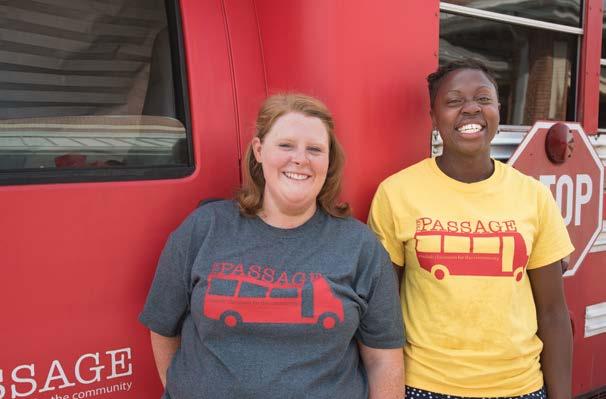
MORE ON THE WEB: utc.edu/MobilePassage
“It’s been so rewarding to work with the parents in a new way,” she continued. “As a teacher, we regularly go to professional development classes. We were talking one day and I said to Brittany, ‘Why isn’t this offered to parents?’ They’re the students’ first teachers. Getting to see parents have an ‘a-ha moment’ like we do with our students when we help them learn something new is just amazing. After a session on the bus, the parents are more excited to send their children to school and help them with their homework.”
Students haven’t just improved academically since Harris and Ryan started their mobile classroom project. Both have seen an improvement in the relationships with students and their parents. “Going out into the community and showing that I care means so much to them,” Harris said. “It isn’t just sharing a
little bit of our Saturday or summer days. It means a lot more to our community. We’re taking the time to get to know them, see where they’re from and let them know that we believe in them.”
Harris and Ryan hope to one day expand their project. In addition to their work during the school year, they regularly take the bus to other local schools, daycare centers and community events. Other educators from across the country have contacted them about starting their own mobile classroom projects. “Seeing the look on the kids’ faces when the bus pulls up has told us that we’re onto something, that this is something our students and their families really want and enjoy,” Ryan said. “This school year, we want to branch out to more areas in Chattanooga. No matter where you live, we want to come to you.”
The Magazine of The University of Tennessee at Chattanooga | 13
regularly goes to community events. below: Colleen Ryan, left, and Brittany Harris, right, teamed up to create The Passage after talking about ways to better connect with their students.

14 | The Magazine of The University of Tennessee at Chattanooga MEDIA
PERSPECTIVE
Assessing Fake News
by Laura Bond
Fake news? Alternate facts? What’s going on?
In today’s partisan world, it can be hard to find the truth. But where did all of this start? For Dr. Amanda Wintersieck, UC Foundation assistant professor of political science, the beginnings of fake news can be traced back to something originally meant to find the truth: fact-checking.

“Fact-checking used to be academic pursuit. The first fact-checking organizations like factcheck.org and politifact.com were run by academics. Now, all media outlets are engaged in some sort of fact-checking,” she said. “Fact-checking now has become a sensationalized part of the campaign process. They’re distorting the truth. Fact-checks by Fox News and CNN reach very different conclusions on the same truths when compared to more neutral sources.”
According to Wintersieck, the mainstream media’s distortions of facts is “in many ways, the genesis of fake news.” “The mainstream media actually lends credibility to the claims that fake news exists. If Fox News, CNN or MSNBC can reach wildly different conclusions based on similar factual circumstances than other major media outlets, then where is the truth? Who’s right, who’s wrong and why? Where’s the disconnect? When the president calls something ‘fake news,’ he’s not
anchoring it on nothing. He’s anchoring it on bits and pieces of evidence that fit his discourse.”
Be careful of viewing the mainstream media as a “watchdog” meant to protect the public from those who misuse their power, she continued. “Ultimately the media is a corporation, and the No. 1 goal of corporations is to earn money. They primarily show negative stories because that’s what sells. They have a very negative, visceral way of reporting to draw in viewers. Seeing these stories increases political cynicism.
“People now have less trust in political systems. Citizens think that American democracy is broken and part of the reason they think it’s broken is because the media is telling them it’s broken,” she said.
So how can the average American combat the rise of sensationalized fact-checking and still stay politically informed? Wintersieck has a couple of recommendations, starting with choosing to read the news instead of watching it on the television. “The format of a newspaper allows greater space for analysis and complexity of issues than the one-minute segments on a cable news show. The reader is able to get a greater amount of information about complex issues to make a decision. If you choose to watch your news, make sure to watch something more neutral and watch a variety of
shows,” she recommended.
Wintersieck also suggested that American citizens engage with opposing viewpoints that will challenge their beliefs and their ways of thinking. This will create cognitive dissonance, otherwise known as those uncomfortable feelings we get when we have two conflicting thoughts at the same time.
“As people, we like to exist in a nice, euphoric state. We hate to engage in cognitive dissonance. Anything that challenges our views or the way we view the world, we are motivated to argue against it and reject it,” she said. “We want to create these tidy worlds and, in the pursuit of creating that, we’re doing ourselves and our country a disservice. My advice to everyone, especially my students, is to accept the chaos. Accept the complexity of living in a democratic society.”
The Magazine of The University of Tennessee at Chattanooga | 15
Amanda Wintersieck
SPECIAL INTERNSHIP
Mental Health Court
by Shawn Ryan
Hannah Hytken spends 40 hours a week at her job as a case manager in the Johnson Mental Health Center on the North Shore. On top of that, she’s taking 15 hours of courses and labs in her pursuit of a master’s in social work at UTC.
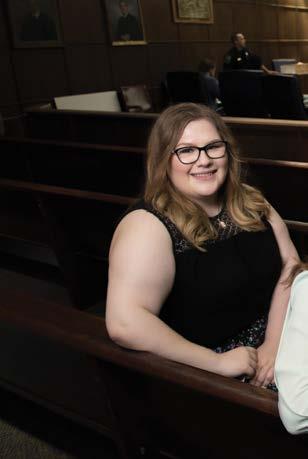
And on top of that, she’s spending about 16 hours a week as the Department of Social Work’s first-ever intern in the Hamilton County Mental Health Court. “Surprisingly, I have slept, I just haven’t been able to do anything else,” Hytken ’16 says with a laugh. “I don’t have weekends any more. Every day is a work day. I knew I was coming into it and taking on a lot and not having a social life.”
She and D. Nicole Johnson, a senior in Legal Assistant Studies who will graduate in December, are the first UTC interns the Mental Health Court has ever had. For both, the internship has dropped them into the arena they hope to enter as professionals. In all likelihood, the skills they learn will be part of their daily work in an eventual, fulltime job. Schoolwork is one thing; hands-on work inside a courtroom or with a Mental Health Court participant is another.
Mental Health Court deals with criminal defendants from Hamilton County who’ve been diagnosed with a mental illness. The court takes both felony and misdemeanor defendants, but their crimes must have a sentence that is 10 years or less, and those whose offense involves violence or who have a history of violence are not eligible. Defendants must volunteer for court and agree for the court to be part of their treatment. They must take their prescribed medication, and they can’t just sit in therapy sessions, mute and antagonistic.
Hytken and Johnson work directly with court officials, including district attorneys, judges, probation officers, case workers and the defendants, among others. “The first day I got to go and observe the team meeting that goes on before Mental Health Court,” Hytken says. The three-hour meeting went over every person on the court docket that day, discussing a host of issues.
“What’s been going on with them? What’s the next step in treatment?” she says. “It was really cool because they agree on everything as a team. Decisions are made as a team rather than one professional.”
Johnson says her first few days were “a bit all over the place.” Days include time in court, conducting research and going over paperwork. But, while the learning curve has been fairly steep, she’s picking up valuable skills and expects that to continue.
“I have learned about how important it is to make connections, so that is definitely something I would love to learn more about,” she says. “As my time goes on I believe I will be more involved with clients and the work the MHC does on a day-to-day basis.”
From the UTC departments of Legal Assistant Studies and Social Work, it’s a matter of getting students into genuine situations they’ll face when they are working full time in their career. “What we’re really hoping is that they get a lot of practical experience. We want the students to be able to utilize what they’ve learned in the program and apply it in real life,” says Karen McGuffee, Legal Assistant Studies coordinator in the Department of Social, Cultural and Justice Studies. Students in Legal Assistance Studies must have an internship to graduate, she explains, but most are “in law firms, traditional settings and things like that.”
16 | The Magazine of The University of Tennessee at Chattanooga
COMMUNITY
An internship in Mental Health Court “is a great idea to expand our horizons and learn other aspects of the legal system,” McGuffee adds. “And it’s real-world experience. Not just sitting around.”
Internships also are required in Social Work, says Jodi Whitted, clinical instructor and director of field social work. Through the internship, “students really have the opportunity to engage with individuals on a person-to-person basis, able to evaluate if what they’re doing is effective,” she says. “We really focus on all the different parts and pieces of a person’s environment or life.” By blending those together, a social worker can create a program to impact that person with functioning and well-being. “The most important thing to me is that our students have a good experience, a fulfilling experience, one that is going to enable them to meet their learning goals,” Whitted explains.
From the court side of the internship, there is “certainly the fact that they can come and get involved in what we do, help and assist us in our daily activities,” reports Anna Protano-Biggs, director of the Mental Health Court. But it goes far beyond that. “We hope to strengthen their problem-solving skills, their ability to think outside the box, their active listening skills and their ability to form collaborative relationships in their own work as they start or continue their careers,” she says. “One of the things I try to do with students is enable them to see
as much as they want. I sit down with the student at the beginning and say, ‘What do you want to get out of this?’”
Hytken and Johnson say taking their classroom knowledge and mixing it with the day-to-day realities of Mental Health Court is one of their major goals—and not only because it could help them land fulltime jobs when they graduate. “It’s being able to see the bigger picture and all the other agencies that are working and are a part of it,” Hytken says. “Just seeing how many different people and agencies are working together, it’s just really cool. I have a strong feeling that I’m a part of something.”
Although her pursuit of a bachelor’s degree in legal assistance might seem more judicial than psychological, Johnson says she has larger goals for her internship. “I want to feel as if I have helped people who suffer from mental illnesses. Even if it is just one person, I want to know I have helped them. Mental health issues are easily missed in the criminal justice system and to be a part of a court that helps people who suffer from a mental health problem is an amazing opportunity I am glad to have.”
For Hytken, a career as a social worker was always part of the plan. “Just my experience as a case worker for the last few years, I know that this is what I want to do. I’m not coming into it like, “Oooh, maybe I want to do this.’ I know.”

The Magazine of The University of Tennessee at Chattanooga | 17
D. Nicole Johnson, left, and Hannah Hytken sit in Judge Don Poole’s courtroom at the Courts Building.
YOU SHOULD SEE US
1. CHAMBERLAIN FIELD, THEN: At the time our football team moved to Finley Stadium, Chamberlain Field was the oldest college stadium in continuous use. Remember the day we threw the Mighty Moc shoe mascot over the top of the stadium?

2. CHAMBERLAIN FIELD AND PAVILION, NOW: Chamberlain Field has been transformed from a field of athletic competition into the very heart of campus. Adorned with a giant Power C on its south bank, the beautiful greenway is also home to Chamberlain Pavilion, a reminder of our strong campus heritage and a symbol of our bright future.

3. LUPTON LIBRARY, THEN: When it opened in 1974, the Lupton Library seemed like the epitome of academic facilities. Remember those late nights in the stacks or hours spent on microfiche?
4. UTC LIBRARY, NOW: The new UTC Library is a 21st century research hub with academic services to help students succeed. You’ll still realize that you are in a library, just a whole lot nicer one that also serves Starbucks. See page 28 to learn what role the original library location plays today.
5. ARC: Think about the number of hours you spent leaning over a billiard table in the UC game room. With the Aquatics and Recreation Center, today’s students have a lot more options for their free time. An indoor climbing wall, track, basketball courts, workout areas and an indoor pool complete with a two-story water slide and lazy river combine to make the ARC the ultimate after-class student destination.
1 2
NOW!
You know your alma mater. The campus in the shadow of Lookout Mountain. Emblazoned blue and gold. But have you visited the UTC campus recently? You might be surprised at the growth and changes that have occurred since you graduated, even if it was just a few years ago.
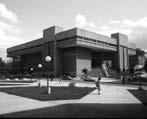

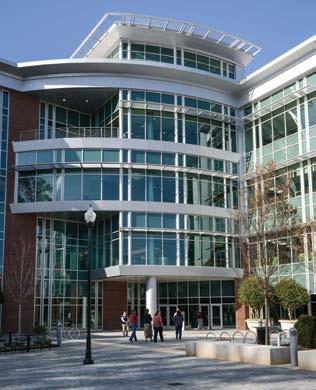

4 5
3
A LABOR OF LABS
UTC Produces Grads “Equal to Anyone”
by Shawn Ryan
Ken Hitchman, ponytail dangling down his neck, safety glasses over his eyes, slowly inserts a large syringe into a small bottle, gently drawing up some of its clear liquid. He squirts it into a flask, then lifts a brown bottle—also large—and slowly pours its liquid into the flask. Using another, smaller syringe, he injects the mixture into tiny glass tubes known as pipettes.
It’s a procedure he performs multiple times a day— sometimes more than 100—and one he learned as a chemistry major at the University of Tennessee at Chattanooga. Today, as a chemist at Vision Laboratories, Hitchman ’03 says skills developed at the university are applied to his job on a daily basis.
“What I get back to is just the basic lab skills that are so important—knowing how to properly use everything from glassware to instruments,” says Hitchman, who has been at Vision for about a year and whose primary responsibility is to prepare samples for a urine drug screen. “The accuracy you learn there, a lot of the professors are very good at that, getting across the point of accuracy,” says Hitchman.
Accuracy is essential at the Chattanooga-based lab, which uses toxicology and genetic testing to determine, among other things, how well—or how poorly—a drug is going to work for a specific person. Vision is not the lab that tests a potential employee’s blood or urine to see if illicit drugs are present.
In its three years of operation, Vision’s expansion has exploded into 22 states and has done so with UTC students filling more than half its local staff of 16 employees; seven of them majored in chemistry, biochemistry or biology, and one graduated with a degree in political science and now works in sales and marketing. Holli Davidson ’07, its chief of operations, earned a degree in psychology. “We kind of pilfer UTC’s best and their brightest,” says Dr. Stephen Dreskin, an anesthesiologist and pain management physician who created Vision Labs with Dr. Lekh Sharma.
Dreskin, whose office is located several doors from the labs in an office park off Gunbarrel Road, is a graduate of Harvard University, so he knows smart people when he sees them. He believes UTC has smart people. “I can honestly say that some of the scientists we see at UTC are equal to anyone we’ve seen at major institutions,” he says as his mammoth black Labrador, Moshe, wanders happily around the office, looking for anyone willing to pet him.
White, beige and shiny-chrome equipment hums throughout Vision Labs’ gas chromatographers and spectrometers to analyze samples. Extractors reach down to the DNA level as solutions from pipettes are tested. The instruments are frighteningly expensive. On eBay, asking prices for some refurbished units run from $140,000 to $200,000. Davidson points to a row of equipment on a metal table, instruments with such baffling names as Source 500 Gas Generator, Biomek 4000 and Triple Quad 4500 and perform such equally baffling tasks as ultra-high performance liquid chromatography-tandem mass spectrometry. “A row of the instruments could cost $750,000,” Davidson says.
Through samples of saliva, urine or cells swabbed from the cheek, Vision runs tests to determine how a particular drug may react with a person’s metabolism. Perhaps the drug will be flushed out so quickly it won’t have time to work. Conversely, it may stay in the body so long it could trigger an overdose or react badly with another drug already prescribed. “Hospitals and clinics, psychiatric and sleep doctors like to test if a patient is taking the drug as prescribed and how effective it is,” Sharma says. “Sometimes the doctor prescribes a drug, but the patient doesn’t really respond to it the same way. It may be too fast, too slow, or not at all.”
The lab has an ongoing relationship with UTC, keeping an eye on both current students who might want a part-time internship and graduates who might want a full-time job, Davidson says. “It’s always something for us to know that we have such a resource in the university, keeping that connection and having a good track record with graduates. We really appreciate that they know exactly what we need.”
Beyond their knowledge of applied chemistry, the UTC grads have other skills that make them a valuable asset to Vision, Dreskin says. “With any type of laboratory, what’s very important is professionalism and reliability and also a person’s ability to comprehend very complicated scientific information, even though that is not their primary area of study, and to translate and explain that to physicians and hospitals and such that we service.”
Chemistry graduate Rebekkah Cecil ’16 says UTC professors teach students how to be self-sufficient, a key ability in a real-world lab where you must be able to do your job without someone hanging over your shoulder. “The best thing about UTC was it really helped me learn how to work
20 | The Magazine of The University of Tennessee at Chattanooga
RESEARCH
on my own,” she says. “At first you start off with a professor right beside you, but once you get that method down, you become more comfortable. It’s not like they have to be right beside you.”
Chris Ooten ’14, who works in Vision’s genetics lab, says “pretty much everything I learned at UTC is used here.” He also picked up the extra skill of how to properly operate the various instruments in the lab. Knowing how to use them, he says, means you may be able to repair them. “If you know how it works, you know how to fix it when it breaks.”
Even with their sky-high prices, they’re still just machines and machines sometimes need fixing, Davidson says. “It’s like a car. They’re going to break down and need some servicing,” she says. “Having a crew of people who understand the instruments on that level saves us on downtime because we don’t have to really wait for a technician.”
Biochemistry graduate Cayce Aksoy ’12 says what she learned at UTC is indispensable. “All of the principles that I learned at UTC, I apply them, literally, every day.”

The Magazine of The University of Tennessee at Chattanooga | 21
Ken Hitchman
GREAT EXPLORATIONS
Life Stages
by Sarah Joyner
UTC actor Gregory Jackson stood in the wings, stage right, and watched as a 10-pound bag of rice was poured over the head of a new bride. The performance was Machinal and the main character had just married a man she didn’t love. Director Gaye Jeffers had the stage crew dump the bag of rice over the new bride’s head as she stood alone, bouquet in hand, about to embark on her honeymoon. Jeffers says this scene where the rice is “pouring down on her like a thunderstorm of regret” (see photo on pg. 24), a moment where the audience instantly entered the character’s world and understood the nightmare that the forced marriage was for her.
“To this day, it was one of the most magical moments in theatre to me,” explains Jackson ’15. These moments are what UTC’s Theatre Company anticipates when they plan and execute each season of productions. “University theatre is the place where we can step outside of a commercial theatre model and introduce students and the Chattanooga community to plays that have shaped our world and ask questions that influence how we live our lives. I like to think that we encourage folks to embrace the known and unknown,” explains Jeffers.
After graduating from UTC, Jackson took that shared sentiment of embracing the known and unknown and ran with it to New York University’s Tisch School of the Arts, where he recently obtained an master’s of fine arts in Musical Theatre Writing. Although initially drawn to theatre as a performer, he switched gears after growing tired of the lack of diversity in characters. He became a theatre writer.
“One of the reasons I write is to create spaces in theatre for people who aren’t represented by the current theatrical landscape,” says Jackson. “As a society, we are beginning to wake up to the importance of diversity in all aspects of storytelling. Some have been awake forever, but many others are just now rubbing the sleep from their eyes. Progress works like that sometimes, but I kind of want my work to be an alarm clock so loud that no one is late to the party.” A sampling of his characters include a leading male of color dealing with the loss of his husband, the dead husband’s ghost and a hunky gardener.

22 | The Magazine of The University of Tennessee at Chattanooga
ARTS
above: Gregory Jackson performs in UTC Theatre Company’s 2011 production of The Roller Bridegroom. opposite: The Grecian underworld for UTC Theatre Company’s 2016 production of Eurydice had a modern twist by retelling the Greek myth Orpheus from the perspective of his wife.
Many students who flock to the UTC Department of Theatre and Speech dream of their time in the spotlight. But they leave knowing how to shine that spotlight or stitch the costume or decorate the space behind, above, below and between characters. They decide to be in theatre, but expand their knowledge beyond acting. Students are quick to agree that this well-rounded approach to theatre is what makes their degree so useful. Many leave with a new passion ignited in the shops, sound booths and moments backstage in the Fine Arts Center.
Last fall, the Dorothy Hackett Ward Theatre was transformed into a Grecian underworld with a modern twist. Students, directors and professors teamed up to create the world of Sarah Ruhl’s Eurydice, described as having a man-made quality that mocked “nature, horror movies and Willy Wonka.”
“Our set designer, Adam Miecielica, drew up this beautifully dark and eerie design for the underworld,” explains senior theatre major Nicholas Sterling. Construction of 24-foot walls and magically indestructible books tested their skills and creativity. “The props were extremely specific, which can sometimes make things very hard, but it was our job to honor the script and what our director envisioned for the world of the show. The script called for a large Complete Works of William Shakespeare that the lead,

The Magazine of The University of Tennessee at Chattanooga | 23
“The props were extremely specific, which can sometimes make things very hard, but it was our job to honor the script and what our director envisioned for the world of the show.”
Eurydice, had to stomp on, throw and kick all over the stage,” says Rachel Shannon, senior theatre major. “I had absolutely no idea how I was supposed to make this indestructible magic book! I searched for a while, trying to find something extremely sturdy, but I finally just decided to make it. We made three, knowing there was a possibility that one could break. We papier-mâchéd, decoupaged and painted these three absolutely beautiful books. In the end, they looked like they were antiques. That was a proud moment for my crew and for me.”
Jeffers says, “As human beings, we crave a shared experience. Theatre supplies an instant community to those who seek a moment to reflect and be jolted, challenged and entertained.” She describes an interaction between two of her audience members after watching Jean Paul Sarte’s No a play that Jeffers directed on campus a few years ago. She watched as a student turned to his friend next to him and said, “I feel different. Something
“This small exchange,” Jeffers says, “solidified my belief that great art speaks—and serves an important purpose in our society. While we obviously choose a season based on the needs of theatre majors, we also take quite seriously the role we play in the lives of all students at UTC. We are here at this university to explore and expand. I believe that theatre majors and other artists on campus are playing an important role in urging exploration.”
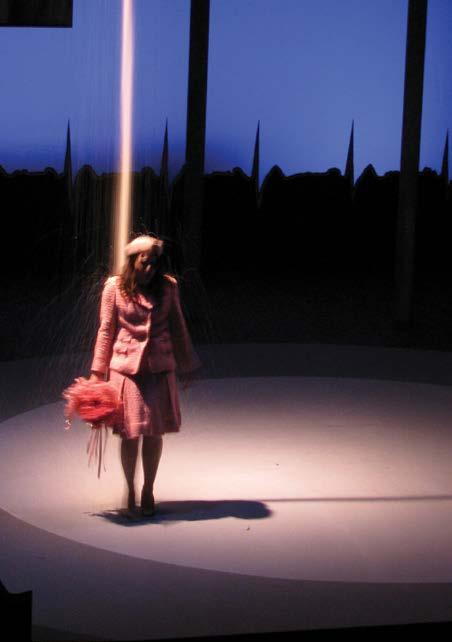
24 | The Magazine of The University of Tennessee at Chattanooga
Rice pours over the main character’s head in UTC Theatre Company’s 2010 production of a play about the first woman in New York to be executed in the electric chair.
FAST RISE IN FINANCE
UTC Grad Veltenaar Named to InvestmentNews’ “40 Under 40”
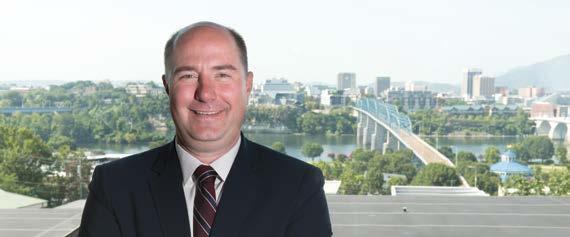 by Shawn Ryan
by Shawn Ryan
When Reese Veltenaar was earning a bachelor’s degree in finance at the University of Florida, he “felt like a number.” When he came to UTC to earn a master’s degree in accounting, he “felt like a student.”
“That kind of feeling of an interest by the teachers, a true, genuine interest by the teachers to see every student succeed, is really, really, really powerful,” says Veltenaar ’07.
As one of the partners at Acumen Wealth Advisors on Chattanooga’s North Shore, Veltenaar has succeeded quite well. With his partner John Owen and their team of six employees, in a little over five years they’ve built up about 120 clients and now manage assets of about $150 million. Based on his business résumé and a future that seems nothing but bright, the 38-year-old Veltenaar recently was selected by InvestmentNews magazine as one of the nation’s “Top 40 Under 40” in the financial industry.
“Key attributes we look for among the almost 1,200 nominations of advisors and associated professionals we receive each year are accomplishment to date, contribution to the industry, and leadership and promise,” says a statement on InvestmentNews’ website.
Veltenaar was nominated by Beth Tremaine, portfolio manager at Acumen.
They have known each other for years, having both worked at Regions Bank in the past.
“Times when clients would decline the guidance, to their financial detriment, would cause Reese more angst than it would the client,” Tremaine says. “Reese’s energy, passion and integrity are genuine and inspiring.”
Sitting in Acumen’s top floor conference room, a dazzling view of downtown Chattanooga behind him, Veltenaar knew Tremaine had nominated him, but admits he was “pretty excited” when he was actually selected. Delivery of the news was a bit underwhelming, though. “It came in an email,” he says with a laugh, something he does frequently. “I opened up the email and it said ‘Congratulations!’ in big, blue letters.
“I feel like I received the award on behalf of the whole group because it’s a team effort.”
Veltenaar also credits what he learned in the UTC master’s program for helping Acumen succeed, including one key element.
“Taxes. Having the background and the master’s in accounting allows us to do things from a tax perspective that I think is really unique.”
Veltenaar says the entire Acumen
staff has an ingrained goal of “putting the client’s best interests first,” a fiduciary philosophy that makes the firm a guardian of a client’s money, not a way for it to make a boatload of cash on the backs of others. “Whatever advice we give, we have to eliminate all conflicts of interest or minimize conflicts of interest,” he says.
A hefty part of Acumen’s overarching philosophy can be traced back to Veltenaar’s family. His maternal grandfather had accumulated a decent amount of money through a couple of motels he owned in Daytona Beach, Fla. When he died in 1999, the money went to his mother, a “struggling” single mom, Veltenaar says. Based on the advice of a financial advisor, she invested the money in the dot.com market. When the dot.com bubble burst around 2001, she “lost a pretty significant part” of the investment. Veltenaar doesn’t think the advisor tried to rip her off, but the person didn’t do a good job.
“It’s really hard for people to evaluate financial advisors,” he says. “It’s a very complex language and there’s a lot of intricacies with taxes and all the other stuff that goes with it so, like with anything else, you have to trust the advice of the person who’s giving it to you.”
The Magazine of The University of Tennessee at Chattanooga | 25
PROFILE
Reese Veltenaar
When Lamont Paris graduated from the tiny College of Wooster in north-central Ohio, he wasn’t in a hurry to get a “real job.” So when his coach offered him an opportunity to join the coaching staff the following year, Paris jumped at the chance. “I figured I had a good number of friends from the team that would still be around to spend time with… and 21 years later…” Twenty-one years later, Paris has a real job as Head Men’s Basketball Coach for the UT Chattanooga Mocs.
“I was attracted to UTC for a variety of reasons,” said Paris. “Overall, I’d say it was the total package in my mind in terms of tradition, overall support, and I think the chance to win here is tremendous.” Paris came to Chattanooga from the University of Wisconsin where he was an assistant coach for seven seasons. The Badgers made two trips to the NCAA Final Four and six Sweet 16 showings during Paris’ time there, and Lamont played an instrumental role in the Badgers’ rise to national hoops prominence.
While Paris was at Wisconsin, the Badgers won 12 or more Big Ten games every season. They captured the league title in 2015 and never finished lower than fourth. Lamont gained a well-earned reputation as a top recruiter and developer of talent. He is largely credited with developing All-America and current Charlotte Hornets big man Frank Kaminsky as well as NBA players Sam Dekker, Nigel Hayes, Bronson Koenig and Ethan Happ, among others who have gone on to play professionally.
A native of Findlay, Ohio, Paris earned a bachelor’s degree in business economics from Wooster in 1996 and a master’s degree in recreation and sports management from Indiana State University in 2000. He played four seasons at Wooster

GAME CHANGERS
Up-and-Coming, New UTC Coaches for Basketball and Football
by Chuck Cantrell
and was named the team’s MVP and captain his senior year.
“We are all very proud and excited for Lamont as he begins this new opportunity,” Wisconsin Head Coach Greg Gard said. “We will always be grateful to Lamont for everything he did for this program, particularly over the past two seasons helping me in my transition to head coach. The Mocs are undoubtedly in good hands.”
Paris brings to UTC the credibility of being part of an impressive mark of 487 winning basketball games, including those six trips to the Sweet 16 and two trips to the NCAA Final Four. Wisconsin was the U.S. national runner-up in 2015. Not too bad for a guy who got into coaching to avoid a “real job,” right?
“I have been lucky to have several important professional mentors,” said Paris. “I have to single out my college coach, Steve Moore at Wooster. He is one of the winningest college basketball coaches at any level and one of the highest-quality human beings I have ever encountered, a great teacher of the game. I have also been heavily influenced by Bo Ryan, (retired Wisconsin coach), a Hall of Fame coach who let me hang around and exchange basketball ideas for six years.”
Paris, who is single, stays busy. “Because our sport spans both first and second semester, there is not a lot of down- time, but I do enjoy watching movies, listening to music, playing golf and, of course, watching basketball.” Paris recounts how he and his brother were rewarded with ice cream for winning performances in Little League baseball. “Winning is important, but tough, competitive, reliable and consistent are the words I’d like people to use when describing UTC teams under my leadership. And yes, winners, too,” he said.
26 | The Magazine of The University of Tennessee at Chattanooga SPORTS NEWS
Lamont Paris
Tom Arth didn’t start out wanting to be a coach. “All I ever thought about since I was five years old was playing football. I really never thought about coaching when I was playing. But I kept having guys say to me, ‘Hey, you’d be a great coach.’ It used to really frustrate me because all I wanted them to tell me was, ‘You’re going to be a great player.’ They just always kept talking about coaching.”
Not that Arth didn’t prove his mettle as a player. As a starting quarterback for four years at his alma mater, John Carroll University in Cleveland, Ohio, Arth earned unanimous All-America honors as a junior and senior and captured every major passing record at John Carroll, including passing yards (10,457) and touchdowns (89). He then spent three seasons with the Indianapolis Colts, serving as back-up quarterback to Peyton Manning and also played professionally with two teams in Europe and Canada.
Turns out, all those voices telling Arth to coach were right. After spending a year working outside of football, Arth received an offer to coach quarterbacks and serve as co-offensive coordinator at John Carroll. “I had a good job at a great company, so it was a tough decision,” Arth said. “But outside my family, football has always been the most important thing in my life. I realized that coaching was probably what I was meant to do. It’s been one of the best decisions I’ve ever made.”
He became head coach of the John Carroll Blue Streaks in 2012. After four seasons guiding the team, Arth had compiled a 40-8 record and his teams finished in the Top 25 all four years, including a No. 3 ranking in 2016. Arth was named 2016 NCAA Division III National Coach of the Year and the Ohio Conference Coach of the Year.
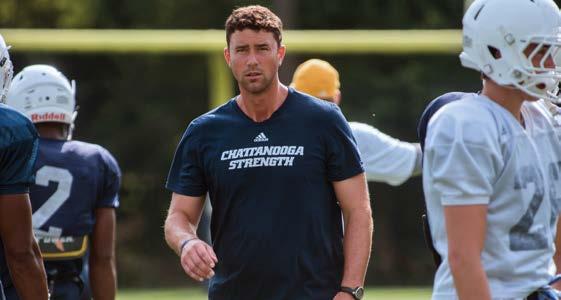
Now Arth brings his expertise and leadership to
Chattanooga as Mocs Head Football Coach. “I was immediately attracted to the success of the program—the championships and the type of players that were here,” said Arth. “But as I learned more about the school—about the academic programs and the success of the graduates—it really excited me. Being able to confidently recruit student-athletes, and being able to confidently recruit their families, knowing that no matter what happens from a football perspective, whether they have an incredible career on the field or not, they’re going to graduate at UTC with opportunities to be successful and to be leaders, and to impact the world. That’s important to me.”
For Arth, football takes a backseat only to his family. The father of five admits he has very little downtime, and that’s just fine with him. “When I’m away from work, 100 percent of my time is dedicated to my family, and I wouldn’t want it any other way. I’m so blessed to have an incredible family, so when I leave work, I’m going straight to see them or whatever they’re doing to be involved as much as I can.”
Arth has focused on building his Mocs team with a foundation of outstanding returning performers and talented new recruits. Speaking to the Chattanooga Quarterback Club, Arth said, “There are only a few schools at any college football level that have a realistic chance at winning a national championship and Chattanooga is one of those schools. Our players have to have a commitment to excellence, a relentless belief in our system, themselves and their teammates and a tireless will to compete and to win. I’ve been so blown away by the support that we have here. I’d hope we can multiply it by 10. Our team, our coaches and I will never take support for granted. We have a responsibility to go out there and play for them, as much as we’re playing for anything else.”
The Magazine of The University of Tennessee at Chattanooga | 27
Tom Arth
NEW ATHLETIC DIRECTOR JOINS UTC FROM PENN STATE
Mark Wharton was named the new UT Chattanooga Vice Chancellor and Director of Athletics in August. A 22-year veteran of college athletics, Wharton most recently spent four years at Penn State as a member of the Athletics Senior Management Team. During his tenure there, Wharton was a member of the Executive Committee for the Departmental Strategic Plan, the Facilities Master Plan Committee, Communications Committee and developed revenue generation plans for the Athletics Department leadership team. He had oversight for a staff of 23 professionals and helped raise $38 million in total cash and support, including $17.35 million in annual fund donations. He also served as the sport oversight for wrestling and men’s basketball.
Prior to joining Penn State, Wharton was the Assistant Athletics Director/Executive Director of the East Carolina University Educational Foundation Pirate Club from 2006-13; Associate Athletic Director for Development at the University of Nevada, Las Vegas and served for 13 years in full-time development, ticketing and marketing roles in upper administration positions at UNC-Asheville, James Madison and East Carolina. He holds a bachelor’s degree from East Carolina and a master’s degree in Human Ecology with an emphasis in Sport Management from the University of Tennessee. Wharton succeeds David Blackburn as University Athletic Director. Blackburn resigned his position in June.

ORIGINAL LIBRARY GAINS NEW LIFE; DECOSIMO CENTER TARGETS STUDENT SUCCESS
Students are finding a new set of tools for academic success in Fletcher Hall, the former University and public library. Home to the UTC College of Business today, the historic building now includes the recently opened Joseph F. Decosimo Success Center.

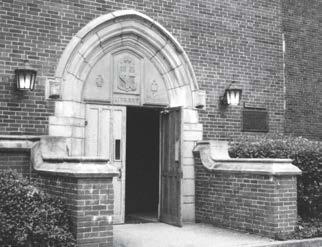
The Decosimo Success Center helps provide business students with the tools and support they need to be academically prepared and business-world ready. This one-stop shop offers academic advising, experiential learning opportunities and career development assistance. Renovations on the second floor of Fletcher created team rooms, interview rooms, collaborative work spaces and student study areas.
“The Decosimo Student Success Center is an investment in our students and reflects our commitment to ensuring that they are academically successful and prepared for professional careers and life long personal growth and development,” said Robert Dooley, dean of the UTC College of Business.
“Joe Decosimo has had a profound impact on UTC, the College of Business and the Chattanooga business environment. He is a great example to our students.”
Coordinating internships for students is a large part of the Decosimo Success Center’s goals, although certainly not the only one. When it opened for business in 2013, the center “had maybe 35 internships. We now have over 600 opportunities,” said Center Director Sue Culpepper, who spent 25 years in local banking before joining UTC. Seventythree percent of business students who complete internships through the center landed full time employment within three months of graduation. The national average is 58 percent.
28 | The Magazine of The University of Tennessee at Chattanooga ON CAMPUS
Mark Wharton
2017 ATHLETICS HALL OF FAME
Honorees, left to right: Bryan Patten, Derrick Craine, Julie Dunn Heim, Julie Copeland Christian, John Tyszkiewicz, John Bonner III, Chris Thornbury, Ruth Obear, Fred Obear, Kenyon Earl
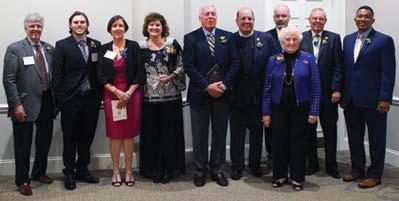
The 2017 Athletics Hall of Fame inductees spanned almost three decades of Mocs athletic achievement. One new honoree was an All-America member of the Mocs football team from 1965-68, while another was a standout quarterback from 1991-94. Five former Mocs were inducted into the AHOF for 2017. They include:
Julie Copeland Christian ’92, a four-year starter in women’s basketball from 1988-91, helped UTC to its first-ever NCAA Tournament appearance as a sophomore and led the team in scoring in 1990. Her 1,406 career points are eighth all-time at UTC. A two-time AllSouthern Conference selection, Copeland also guided the Lady Mocs to the 1991 regular season SoCon title. Today, Christian is an engineering manager at Recro Pharma in Gainesville, Ga.
Kenyon Earl ’95 graduated as UTC’s all-time leading passer with 6,400 yards during his football career from 199194. His 42 career touchdown passes also marked a school record. He was the Scrappy Moore Award winner as team MVP in 1991 and won the Mocs most valuable back honors in 1993. Now, some 22 years later, Earl is an agent for Farm Bureau Insurance in Orangeburg, S.C.
Julie Dunn Heim ’92 was a member of the first Golden Era of Chattanooga Women’s Tennis, 1977-80. She was a four-year letter winner during UTC’s run of AIAW National Championships from 197779. Julie was an All-America selection as a leading member of the Mocs 1978 national title team. Today, Heim is retired from a career in nursing and lives in Decatur, Ill.
Chris Thornbury ’90 was a three-time Southern Conference Champion wrestler who was ranked nationally as a top 10 heavyweight his senior year. A three-time champion, he captured the Southern Conference 190-pound weight class title in 1986 and heavyweight title in 1987 and 1989. His 38 wins in 1989 are the second-most in a season by a Mocs wrestler, and his 101 career victories rank eighth alltime at UTC. Today, Thornbury is a teacher and coach at Murray County High School in Chatsworth, Ga.
John “Big John” Tyszkiewicz ’68 was a Mocs football captain for head coach Harold Wilkes’ first team (1968) that finished the year 9-1. He was a Little All-America honoree in 1967 and the teams he performed on went 26-13-1 over his four seasons. Big John was drafted
by the Houston Oilers in 15th round in 1969. Today, he is a retired teacher and coach, from Parlin, N.J. Tyszkiewicz is probably the only Mocs athlete to be singled out in a Bon Jovi song. Jon Bon Jovi was a student at Sayreville (N.J.) War Memorial High School, where Tyszkiewicz taught. In the song Just Older , the rocker sings, “Tell Coach T. I cut my hair!”
The A.C. “Scrappy” Moore Award is presented each year to a UTC student-athlete who best personifies the athletic department’s mission of equipping for success in the classroom, in competition and in the community. Derrick Craine is an All-America running back for the Mocs. He is only the third player who racked up two 1,000-yard rushing seasons for the Mocs while also being named twice to Academic All-America teams, the lone football player in school history to do both.
The Gordon Davenport Award is given annually to a person who has shown outstanding commitment to the Chattanooga Mocs athletics program. Bryan Patten is a long-time supporter of the Mocs who just finished a 10year run as the chairman of the Finley Stadium Corp.
The Joe Morrison Award is awarded to a former student-athlete or coach for notable accomplishments and life experiences. Former Chattanooga football standout John Bonner III ’79 is a longtime Episcopal minister and the current interim rector at St. Peter’s Episcopal Church in Chattanooga.
The Harold Wilkes Award was established to recognize a volunteer, coach, staff member or University administrator who has demonstrated exemplary leadership in furthering the vision of Chattanooga Athletics. Dr. Fred and Ruth Obear , two of the Mocs’ biggest fans, jointly received this year’s award. The former Chancellor and his wife can be found supporting every Mocs team throughout the year.
The UTC Athletics Hall of Fame was established to formally recognize outstanding contributions to the heritage and tradition of the university’s intercollegiate athletic program. A total of 209 individuals have been inducted into the UTC Athletics Hall of Fame, a joint project of the UTC Athletics Department and the Division of Development and Alumni Affairs.
The Magazine of The University of Tennessee at Chattanooga | 29
utc.edu/alumni
MORE ON THE WEB:
NEWS ’n NOTES
LEGENDS AND LEADERS HONOR JOYCE COOK
Without Joyce Ireland Cook, the world would still be observing the use of those clunky, credit card, carbon-copyproducing machines used by sales checkout clerks. Today, you swipe or insert your credit card and you’re finished at the counter. If you’re glad those machines are long gone, then you have Joyce Cook to thank for a much better system.
As part of Legends and Leaders honors for this year, Cook was named the University of Tennessee at Chattanooga 2017 Distinguished Alumna Award recipient. She has accomplished much since graduating as an honors student from the University of Chattanooga. Her professional career began spending several years teaching before Cook eventually moved to Nashville and changed professions. In the early 1980s she was introduced to an emerging industry that allowed for credit card point of sale electronic processing.
ALUMNI ASSOCIATION OFFICERS:
Donna Lawrence, ‘81 President Business Owner Deal Properties, LLC
Richard A. Johnson, ‘81 President-elect Vice President of Development WTCI TV
Daniel Day, ’89, ‘95 Executive Director, Advisory Ernst and Young LLP
Tyler Spry, ‘09 Treasurer
Financial Advisor
Northwestern Mutual
Virginia Waddell, ‘89 Secretary Senior Investment Officer Unum Group, Inc.
Douglas A. Brown, ‘85
Immediate Past President Vice President UBS Financial Services
BOARD MEMBERS:
Don E. Adkins, ‘94 Banker and Small Business Owner First Volunteer Bank and RE/MAX Realty South
Uras Agee, ‘95 Principal Brainerd High School
Jay Dale, ’94, ‘01 Vice President First Tennessee Bank
Mary R. Danielson, ‘92 Media Relations Manager BlueCross BlueShield of Tennessee
Amy Davis, ‘87 Mocs One Director University of Tennessee at Chattanooga
Aaron DeLaughter, ’08, ‘14 Consumer Insights Analyst McKee Foods Corp.
Joyce recognized the potential of the new technology, and in 1985 she founded her first company, IMA Payments Systems, which grew to become a nationally recognized business. Cook eventually sold her original business and founded International CyberTrans (ICT), which she led for 13 years until it was sold in 2013.
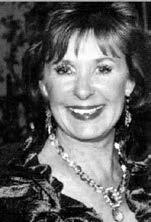
A leader in the electronic transaction industry, Cook co-founded in 1990 the Electronic Transaction Association—the industry’s first trade group—and served on its Board of Directors for 10 years as well as fulfilling two terms as president. From 2006-2009 she represented Tennessee at the Federal Reserve Bank of Atlanta (6th District) as a member of the Reserve Bank’s Advisory Council.
She is married to Thomas Westmoreland Cook, Jr. and has two children, Mary Catherine Krumm and Thomas Westmoreland Cook III, and seven grandchildren. Cook has served on many boards, including the MidTenn Boy Scouts of America, the Middle Tennessee YMCA, the National Association of Women Business Owners, and currently, the Foundation Board of the YMCA, the Tennessee Board for Leukemia,/Lymphoma Society and Justice Industries.
While at the university, Cook was the first female student to hold the office of Secretary-Treasurer of the student body and was active in the Alpha Delta Pi Sorority. In 1999 she established the Joyce Ireland Cook Scholarship Fund to aid young women in the department of business.
Robert Dooley, ’83, ‘91 Dean UTC College of Business
Arnold Farmer, ‘81 Vice President Charter Real Estate Inc.
Drew A. Holland, ‘08 Insurance Agent Farm Bureau Insurance
Jerry Jenkins, ‘73 Accountant Wilkin Cres and Associates
Laura Kay, ‘79 Director of Systems Development Blood Assurance
Annalyn Jones, ’12, ‘13 Contracts Manager
Tennessee Valley Authority
Preston Rogers, ‘84 Assistant Vice President Head, Unum US Contact Center
Stan Russell, ‘85 Financial Advisor Edward Jones Investments
Eddie Smith, ‘95 Director, Sales , Southeast Companion Life
Perry Storey, ’77, ‘83 Director Challenger STEM Learning Center
J. Britt Tabor, ‘89 CFO Erlanger Health Systems
Susie L. Thompson, ‘93 Physical Therapist (PRN)
30 | The Magazine of The University of Tennessee at Chattanooga NEWS ’n NOTES
UTC ALUMNI HERE AND THERE
Richard L. Brown ’80, Executive Vice Chancellor of Finance and Operations at UTC, was the invited speaker at the Bessie Smith Cultural Center’s opening reception for its James Mapp exhibit.

Kevin Ford ’86, professor of music at UTC, and his wife Allyson Ford have introduced the Feldenkrais method to the UTC music curriculum. They presented their work with the method at the World Symposium on Conducting and Choral Music in Barcelona, Spain, in summer 2017.
Carter Wexler ’87 opened Big Frog Brewing in Chattanooga after participating in the UTC School of Business Veterans Entrepreneurship Program.

Todd Gaither ’89 was recently sworn in as President of the Rotary Club of Hamilton Place. Todd is a certified financial advisor with Tandem Financial Partners (a practice of Ameriprise Financial Services).
Jane Cross ’97, a Master Gunnery Sergeant and Chief Librarian of “The President’s Own” United States Marine Band, performed with the group during the 58th Inauguration of the President of the United States, Donald Trump, on January 20, 2017. Cross plays clarinet.
Chris Smith ’97, director of the UTC School of Nursing, was awarded a 2017 University of Tennessee President’s Award. Smith was honored for her outreach, engagement and community service efforts.
Michael E. Miller ’09, news director for WUTC-FM 88.1, won a 2017 Edward R. Murrow Award for feature reporting from the Radio and Television Digital News Association. Miller received the honor for his piece on “Chattanooga Rain,” a song that honors Chattanooga’s Fallen Five who were killed in July 2015. The song is part of the Operation Song Project that works with veterans and their families to address the stress of war through music.

Katelyn Baker ’10 won a $25,000 Milken Educator Award. A teacher at Battle Academy in Chattanooga, Baker was the only 2017 recipient of a Milken award in Tennessee.

Andrew McCarthy-Clark ’11 recently accepted a position as Assistant Director of Annual Giving at American University in Washington, D.C.
Justin Braddock ’12, ’15, appeared on the television quiz show Jeopardy! earlier this summer.
Stephan Jaeger ’12, former Chattanooga Golf Mocs All-America, became the program’s first PGA Tour player, earning his 2018 tour card on the web.com tour.
Kendall Hill ’16 is employed as Marketing Specialist at Assemblers Inc.

Jessica Bastianelli ’17 is now the Community Educator at the Children’s Advocacy Center of Hamilton County. Jessica is currently enrolled in the MPA program at UTC.
Kimiil Crutcher ’17 (left) and Kiyanna Crutcher ’17 (right) followed in their mother’s footsteps when they graduated from UTC in May. Kimolin Crutcher ’90 earned a degree in communication.

BABY MOCS
Chelsea Crouse Sadler ’11, ’14 and husband Steven announce the birth of their son Ruston Ben Browning Sadler, born July 12, 2017.
UTAA recently honored faculty from the Chattanooga campus. Mohammad Ahmadi (left), Guerry professor of management, and Joseph Jordan (center), assistant professor of English, received the UT Alumni Association’s 2017 Outstanding Teacher Awards.
Nicole Brown ’07 (right) received the 2017 UTAA Public Service Award.
Tara Harris Hamilton ’09 and Ali Burke ’09 have created ARRO, a digital graphic novel that follows a team of researchers exploring a postapocalyptic Chattanooga.
NaKeisha Turk ’12 was featured on the Fox network’s reality show Kicking and Screaming. A former UTC cheerleader, Turk traded her life of shopping, fashion and manicures for the jungles of Fiji as a contestant on the program. Andrew Byrum ’15 parlayed a class assignment into “Get Seated,” a smartphone app that checks and predicts restaurant wait times.
Robert Fisher ’15 is currently a Government Innovation Fellow at Harvard Kennedy School Government Performance Lab. Robert is a former Top Moc and a Rhodes Scholar. Kelsey Butler ’16 has created HomeBound, a nonprofit that provides books to elementary school children who otherwise would not have access to books at home.
Anne Lawrence Widener ’12 and husband Ryan Widener welcomed son Jude Henry Widener on July 11, 2017. Jude joins big brother William in the family.
Amanda Cotter ’14 and Lucas Cotter ’13, ’15 welcomed their son James William Cotter on August 21, 2017. He was born at 2:28 p.m., the time of the totality of the eclipse near Chattanooga as it passed over North America.


The Magazine of The University of Tennessee at Chattanooga | 31
PRO FOOTBALL ALUMS
Chattanooga Mocs football fans could see many of their favorite players from the past few years in the National Football League this year. Two Mocs players made final rosters. Corey Levin ’17 was a sixth-round draft pick by the Tennessee Titans as an offensive lineman. Buster Skrine ’11, after five seasons with the Cleveland Browns, joined the New York Jets at cornerback in 2015. Keionta Davis ’17, who signed with the New England Patriots as a rookie free agent defensive lineman, was placed on the team’s reserve list.


Prior to the final cuts at beginning of the NFL season, five other former Mocs were vying for spots on team rosters. C.J. Board ’16 had signed as an undrafted free agent at wide receiver with the Baltimore Ravens; Jacob Huesmann ’15 was vying for a position at fullback with the New York Giants; Chris Lewis-Harris ’12, after time with the Cincinnati Bengals and Baltimore Ravens, sought a cornerback slot with the Denver Broncos; Derrick Lott ’15, after spending time with the Tampa Bay Buccaneers, the Philadelphia Eagles and the Oakland Raiders, signed with the Detroit Lions as a defensive lineman; and Davis Tull ’15, a fifth-round draft pick by the New Orleans Saints in 2015, signed with the Los Angeles Rams as an outside linebacker.


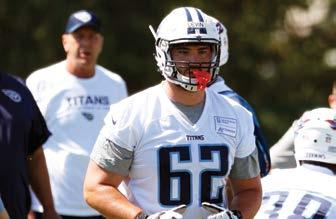

32 | The Magazine of The University of Tennessee at Chattanooga
Buster Skrine
Cory Levin
NEWS ’n NOTES
Keionta Davis
VALEDICTION IN MEMORIUM 2017
Class of 1944
Martha Chisolm
Elizabeth J. McCaslin
Class of 1946
Margaret A. Martin
Class of 1947
Mary-Dove Wright
Rosalie McConnell
Class of 1949
Billye Hemphill
Class of 1950
Mildred P. Ellis
Class of 1951
Hilda Adele Spence
Class of 1952
Charles M. Bull
Robert E. Allison Sr.
Class of 1953
Dewey E. Coffelt
Lewis P. Thatcher, Jr.
Class of 1954
Thomas E. Drake
William B. Thomas
Nancy Emily Jones
Class of 1956
Harriett Josephine Harris
Jerry F. Ward
Class of 1958
Albert C. Richie
J. F. Stinecipher

Donald W. Huskins
Class of 1959
Leland R. Goldston
Class of 1960
John E. Linn Jr.
Margaret F. Hutson
Class of 1961
Roy L. Cannon
Patrick J. Haverty
Class of 1962
Alice Wright Wallace
Class of 1966
Calvin J. Hale, Jr.
Betsy J. Farmer Patton
Class of 1967
Aylor J. Layne
Class of 1968
Brenda Faye Schwall
Class of 1969
James L. Wolford
Class of 1972
James Edward Glasser
Class of 1973
William Lawrence Tolbert
Class of 1974
Benjamin Jay Susman
Class of 1976
John J. Cross
Class of 1977
Susan Marie Knapp
Class of 1979
Armand Martin Hammer
Class of 1980
Ronald E. Evans
Class of 1982
Christine Brown Little
Patrick Royal Dean
Class of 1983
John Bartlett Quinn
John Hawthorne Ufford
Class of 1984
Harold Reece Smith
Class of 1987
Oran William Lovelace, Jr.
Carolyn Elyse Foley
Class of 1988
Wanda Sue Kelley
Class of 1991
Sandra Leigh Bradley
Class of 1992
Rebecca Carraway Baldwin
Kimberly Jo Croft
Class of 1994
Lynne Brock
Class of 1995
Gregory Joseph Koepfer
Class of 1999
Ben G. Elliott
Class of 2011
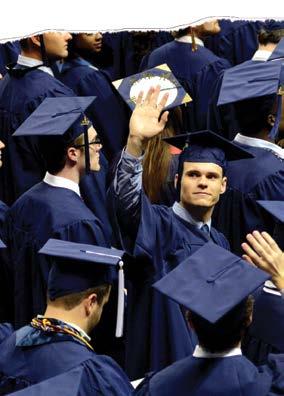
Tabitha O. Jackson

The Magazine of The University of Tennessee at Chattanooga | 33
MAKE YOUR GIFT TODAY.
To me, it’s all about making a difference for the next generation. UTC is a school that provides training— beyond academics—for the leaders of tomorrow.
THAT’S WHY I CHOOSE TO SUPPORT UTC.
GIVE.UTC.EDU/GIVETOUTC
–Udo Schroff ’67
A MAN IN FULL
by Chuck Wasserstrom
EDITOR’S NOTE
Shortly before publication, James L. (Bucky) Wolford ’69 passed away on Sept. 1, 2017, following a lengthy illness. Mr. Wolford will be forever remembered here and in many ways will always be considered Mr. UT Chattanooga.

To say he took the ball and ran with it would be too easy.
To say he was given an opportunity and didn’t fumble it away is certainly a football cliché–although all his future undertakings can directly be traced to his athletic roots.
But when you reflect on all he accomplished, how can you not marvel at the life Bucky Wolford created for himself after arriving on the University of Chattanooga campus back in the mid-1960s?
“I was very fortunate to get a scholarship to play football at the University of Chattanooga,” Wolford said. “I came up here and, as a result of that and what the university did for me, I have always had a strong feeling and a strong commitment to giving back to the university. I don’t feel I would be where I’m at today had it not been for the opportunity they gave me.”
Wolford grew up in Kimberly, Alabama–a rural community half an hour north of Birmingham. His father was a coal miner, his mother was a housewife; neither had a high school education. The family lived in what is referred to as a shotgun house. “You know, you supposedly go to the front door and you shoot a shotgun and you could hit every room in the house,” he said. “We had a four-room house and five children.” His parents slept in one bedroom, and all the kids slept in the other bedroom. The house didn’t have indoor plumbing; if Wolford wanted a shower, he had to take one at his high school.
“The way I grew up was a way of life; that’s what I knew,” he said. But he also
knew that wasn’t the life he wanted for himself.
The University of Chattanooga became his ticket out. He was an immediate success on the football gridiron. It was on Chamberlain Field where he first laid eyes on his future wife, Diane, a majorette in the band. Most importantly, he succeeded in the classroom, where he majored in mathematics and graduated with a GPA over 3.0. “I’d like to think that I took advantage of the opportunity they gave me,” he said. “It’s one of the reasons I majored in math. I did not want to be classified as a dumb jock.”
Earning the degree was the first step in what became a wildly successful business career. But through it all, Wolford’s love for his alma mater never diminished. What’s the best way to pay back the university for giving him a chance? Constantly pay it forward.
Over the years, he increasingly devoted time to UTC athletic programs and alumni programs while serving on the UC Foundation board and the UT Board of Trustees. He called his recent two-year term as chair of the Foundation “the most rewarding thing I’ve done during my life.”
A lot of people can say they felt like they owed their university for giving them a scholarship or giving them a chance, but … people being people, they do a couple of things, then move on to something else. Wolford never deviated from his path.
“I’ve had some great things that happened in my life,” a contemplative Wolford said. “I thought it was great when I returned that kickoff 94 yards against Ole Miss. I thought it was great when I got honorable mention Little All-American. I thought it was great when I set some of the records at Chattanooga that still stand today for football. But nothing could outdo or exceed being chair of the UC Foundation.
“Coming to the University of Chattanooga just opened up so many doors for me… so many opportunities. I’ve been blessed. There’s no other way to say it.”
On second thought, maybe it’s OK to say he took the ball and ran with it.
34 | The Magazine of The University of Tennessee at Chattanooga
NOTABILIS
“The way I grew up was a way of life; that’s what I knew,” he said. But he also knew that wasn’t the life he wanted for himself.
 Blue and gold come to life as ginkgo leaves change to autumn color in downtown Chattanooga.
NOOGA
Blue and gold come to life as ginkgo leaves change to autumn color in downtown Chattanooga.
NOOGA
Office of Communications and Marketing
Dept. 5655
615 McCallie Ave.
Chattanooga, TN 37403
Chattanooga, TN
UTC THEATRE COMPANY PRODUCTIONS 2017–18 SEASON
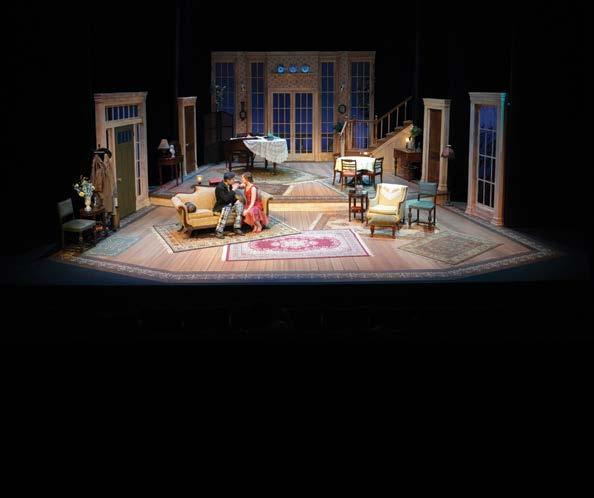
Nov. 14-18
SILENT SKY
by Lauren Gunderson
Feb. 13-17
ELEMENO PEA
by Molly Smith Metzler
Apr. 17-21
CHICAGO, THE MUSICAL
by Kander and Ebb
This true story of astronomer Henrietta Leavitt explores society during a time of immense scientific discoveries, when women’s ideas were dismissed until men claimed credit for them.
Worlds collide and sisters square off in this keenly-observed comedy about ambition, regret and the choices that shape who we become.
In roaring twenties Chicago, Roxie Hart murders a faithless lover and convinces her hapless husband Amos to take the rap...until he finds out he’s been duped and turns on Roxie.
To purchase tickets or show subscriptions, visit utc.edu/theatre-speech/productions or call the box office at (423) 425-4269.
Nonprofit Org. U.S. Postage PAID Permit No. 26


 Chamberlain Pavilion
Chamberlain Pavilion

 The Football Mocs, seen here playing Wofford in 1928, moved to Finley Stadium in 1997. What became of Chamberlain Field? Find out on page 18.
The Football Mocs, seen here playing Wofford in 1928, moved to Finley Stadium in 1997. What became of Chamberlain Field? Find out on page 18.



























 by Shawn Ryan
by Shawn Ryan

























 Blue and gold come to life as ginkgo leaves change to autumn color in downtown Chattanooga.
NOOGA
Blue and gold come to life as ginkgo leaves change to autumn color in downtown Chattanooga.
NOOGA
